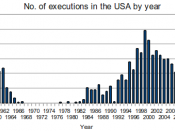INTRODUCTION.
"The issue of capital punishment involves determining whether the execution of criminals is ever justified, and, if so under what circumstances it is permissible. Philosophical defenses of capital punishment typically draw from more general discussions of punishment. The issue of counteractive justice in legal philosophy distinguishes between two principal theories of punishment: utilitarian and retributive. Accordingly, defenses of capital punishment are usually either utilitarian or retributive in nature. By contrast, most criticisms of capital punishment seek to expose flaws in popular justifications of capital punishment. Consequently, in the absence of any good reason for executing a criminal, the critic of capital punishment concludes that the criminal should be allowed to live. "(www.askjeeves.com/definationofcapitalpunishment)
Literature Review
All through history, minorities have been ill represented in the criminal justice system, particularly in cases where the possible outcome is death. In early America blacks were lynched for the slightest violation of informal laws and many of these killings occurred without any type of due process.
As the judicial system has matured, minorities have found better representation but it is not completely unbiased. In the past thirty years strict controls have been implemented but the system still have the symptoms of racial bias. Associate Supreme Court Justice Ruth Bader Ginsberg is quoted as say:
"I have yet to see a death penalty case among the dozens coming to Supreme Court on the eve-of-execution stay applications in which the defendant was well represented at trial. People who are well represented at trial do not get the death penalty." (Speaking at the University of the District of Columbia, April 10, 2001). So the question arises, in today society is there racial discrimination/bias when the death penalty is handed down by a jury?
The Supreme Court in Furman vs. Georgia, 408 U.S.238 (1972) first recognized the...


